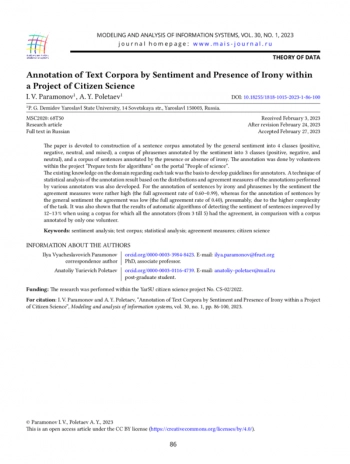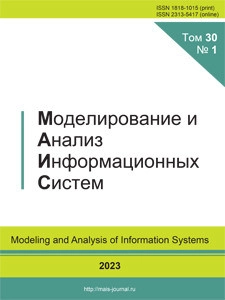-
V. Masoumi, M. Salehi, H. Veisi, G. Haddadian, V. Ranjbar, and M. Sahebdel, Telecrowd: A crowdsourcing approach to create informal to formal text corpora, 2020. arXiv: 2004.11771 [cs.SI].
-
E. Mitiagina, M. Borodataya, E. Volchenkova, N. Ershova, M. Luchinina, and E. Kotelnikov, “Russian Text Corpus of Intimate Partner Violence: Annotation Through Crowdsourcing”, in 7th International Conference on Electronic Governance and Open Society: Challenges in Eurasia. EGOSE 2020, Springer, 2020, pp. 306-321. EDN: ABDNAE
-
S. Mohammad, “A practical guide to sentiment annotation: Challenges and solutions”, in Proceedings of the 7th workshop on computational approaches to subjectivity, sentiment and social media analysis, Association for Computational Linguistics, 2016, pp. 174-179.
-
S. M. Mohammad, P. Sobhani, and S. Kiritchenko, “Stance and Sentiment in Tweets”, Special Section of the ACM Transactions on Internet Technology on Argumentation in Social Media, vol. 17, no. 3, pp. 1-23, 2017.
-
B. R. Chakravarthi, V. Muralidaran, R. Priyadharshini, and J. P. McCrae, “Corpus Creation for Sentiment Analysis in Code-Mixed Tamil-English Text”, in Proceedings of the 1st Joint SLTU and CCURL Workshop (SLTU-CCURL 2020), 2020, pp. 202-210.
-
K. Krippendorff, Content analysis: an introduction to its methodology. Thousand Oaks, CA: SAGE Publications, Inc., 2013.
-
Y. Zhao, B. Qin, and T. Liu, “Creating a fine-grained corpus for chinese sentiment analysis”, IEEE Intelligent Systems, vol. 30, no. 1, pp. 36-43, 2014.
-
J. Cohen, “A coefficient of agreement for nominal scales”, Educational and psychological measurement, vol. 20, no. 1, pp. 37-46, 1960. EDN: JRVDQN
-
J. Bu, L. Ren, S. Zheng, Y. Yang, J. Wang, F. Zhang, and W. Wu, “ASAP: A Chinese Review Dataset Towards Aspect Category Sentiment Analysis and Rating Prediction”, in Proceedings of the 2021 Conference of the North American Chapter of the Association for Computational Linguistics: Human Language Technologies, Association for Computational Linguistics, 2021, pp. 2069-2079.
-
M. Navas-Loro, V. Rodr'ıguez-Doncel, I. Santana-Perez, and A. Sa'nchez, "Spanish Corpus for Sentiment Analysis Towards Brands", in Speech and Computer. SPECOM 2017, A. Karpov, R. Potapova, and I. Mporas, Eds., Springer International Publishing, 2017, pp. 680-689.
-
J. L. Fleiss, "Measuring nominal scale agreement among many raters", Psychological bulletin, vol. 76, no. 5, p. 378, 1971.
-
A. Rogers, A. Romanov, A.Rumshisky, S. Volkova, M. Gronas, and A. Gribov, "RuSentiment: An enriched sentiment analysis dataset for social media in Russian", in Proceedings of the 27th international conference on computational linguistics, 2018, pp. 755-763.
-
T. V. Zherebilo, Slovar lingvisticheskih terminov. Nazran: OOO Piligrim, 2010, in Russian.
-
K. Krippendorff. (2008).Computing Krippendorff's alpha-reliability, [Online]. Available: https: // repository.upenn.edu/asc papers/43/(visited on 01/17/2023).
-
J. Hughes, "krippendorffsalpha: An R package for measuring agreement using Krippendorff's alpha coefficient", The R Journal, vol. 13, no. 1, pp. 413-425, 2021. EDN: QDLEPW
-
L. A. Jeni, J. F. Cohn, and F. De La Torre, "Facing imbalanced data-recommendations for the use of performance metrics", in 2013 Humaine association conference on affective computing and intelligent interaction, IEEE, 2013, pp. 245-251.
-
A. Y. Poletaev and I. V. Paramonov, "Recursive sentiment detection algorithm for Russian sentences", Modelirovanie i Analiz Informatsionnykh Sistem, vol. 29, no. 2, pp. 134-147, 2022, in Russian. EDN: KUHYPB
-
S. Smetanin and M. Komarov, "Deep transfer learning baselines for sentiment analysis in Russian", Information Processing & Management, vol. 58, no. 3, p. 102 484, 2021. EDN: FISPSI
-
R. Artstein and M. Poesio, "Inter-coder agreement for computational linguistics", Computational linguistics, vol. 34, no. 4, pp. 555-596, 2008.






